
“WE NEED TO INCREASE SALES! 🤡 ” If you’ve been in the e-commerce game for a while, you must have heard this for breakfast on a recurring basis.
With so much competition out there, every tiny decision your customers make on your site can be the difference between a sale and a bounce. And let’s be honest, driving traffic to your site is hard enough; the last thing you need is for potential customers to leave without buying.
Conversion rate optimization (CRO) has become a critical focus for ecommerce marketers. Essentially, it means squeezing more revenue out of the traffic you already have. If you’re not optimizing for conversions, you’re leaving money on the table. According to a report from Forrester, the average website conversion rate is only about 2-3% (and we all know for e-commerces that number can be even lower). That’s a lot of room for improvement, and luckily, there are tools designed to help you do just that.
But with so many options out there, it can be challenging to know which tools are worth your time and investment. In this article, we’ll share the top 10 ecommerce conversion optimization tools, so you can make an informed decision. You can thank us later 😉
Table of Contents
1. Pathmonk: Automatically increases sales with AI-personalized buying experiences

Pros:
- Most conversion optimization tools stops at analytics. They analyze what’s happening on your website, and that’s it. Pathmonk, however, uses that data to predict what is each one of your visitors’ next most likely action, to show them a personalized buying experience that will guide them towards purchase. It dynamically adapts your e-commerce to their intent, achieving conversion rates increases of up to 8x. (You can check our real-time performance status here for full disclosure https://status.pathmonk.com/conversions)
- Integration with various e-commerce platforms is seamless, requiring minimal technical expertise, which is a massive plus if you’re looking to implement something quickly.
- Pathmonk’s focus on user intent sets it apart from other tools that primarily emphasize A/B testing. By understanding what users are trying to achieve, Pathmonk can guide them more effectively toward making a purchase.
- The interface is designed with both marketers and developers in mind, meaning it’s accessible to teams with varying levels of technical know-how.
- Unlike many other tools, Pathmonk is equally effective for businesses of all sizes, offering scalable solutions that grow with your company.
- Offers cookieless retargeting and analytics that respect user privacy while still providing insights and personalized experiences.
Discover how to increase e-commerce sales with Pathmonk https://pathmonk.com/increase-e-commerce-conversions-pathmonk/
Increase e-commerce sales with personalized experiences
- Show the right products at the right moment
- Reduce cart abandonment with intent-based nudges
- Turn anonymous visitors into confident buyers

Cons:
- Being relatively new to the market, we are still building our community.That said, our support team is highly responsive and has been praised by many happy customers!
2. Dynamic Yield: Tailor content, recommendations, and experiences
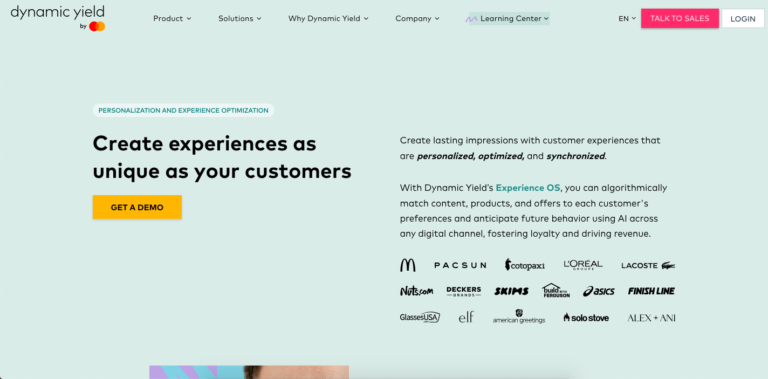
Pros:
- Dynamic Yield is a powerful personalization platform that allows you to tailor content, recommendations, and experiences across your website, apps, and email campaigns.
- It offers robust A/B testing and multivariate testing capabilities, making it easier to find winning combinations that drive conversions.
- The platform integrates well with various ecommerce platforms and has strong machine learning algorithms that improve personalization over time.
- Dynamic Yield supports omnichannel personalization, ensuring a consistent experience across all touchpoints, which is crucial for larger brands.
Cons:
- The platform can be quite complex to set up and use, especially for smaller teams or those without deep technical expertise.
- Dynamic Yield is on the pricier side, which might make it less accessible for smaller businesses or those with limited budgets.
- While it excels at personalization, the real-time capabilities are not as advanced as Pathmonk’s, particularly in responding to individual user intent during a session.
3. Content Square: Comprehensive digital experience analytics
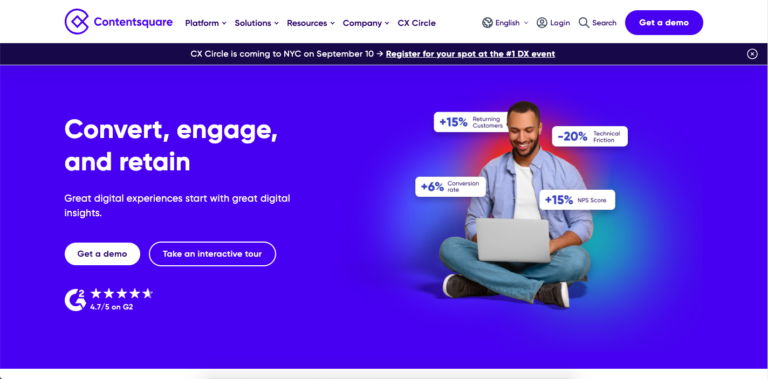
Pros:
- Content Square is a comprehensive digital experience analytics platform that provides deep insights into user behavior through advanced heatmaps, session recordings, and journey mapping.
- It offers granular data analysis, allowing you to pinpoint exactly where users are struggling or dropping off in the conversion funnel.
- The platform’s zone-based heatmaps and interaction tracking provide actionable insights that can help improve your site’s design and user experience.
- Content Square integrates with a wide range of ecommerce platforms and tools, making it easier to incorporate into your existing tech stack.
Cons:
- The sheer volume of data and the complexity of the insights can be overwhelming, making it challenging to know where to start if you’re not an experienced analyst.
- Content Square is quite expensive, which might limit its accessibility to larger businesses with substantial budgets.
- While it offers exceptional analytical capabilities, it lacks the real-time personalization features that Pathmonk offers, which are crucial for driving immediate conversions.
4. Hotjar: The heatmap king
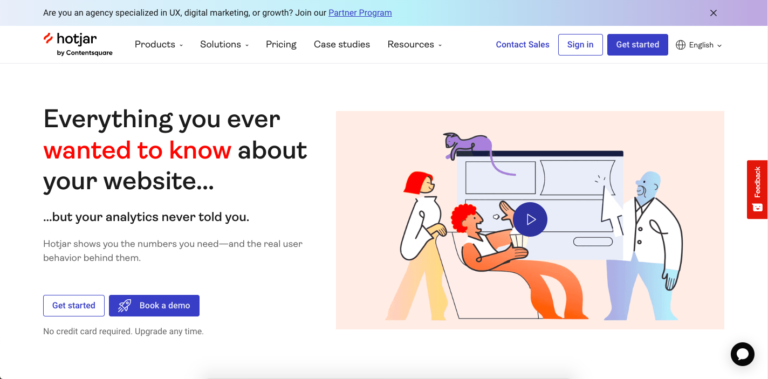
Pros:
- Hotjar is a fantastic tool for those who want to get a visual understanding of how users interact with their site. Its heatmaps and session recordings provide valuable insights into user behavior.
- The interface is straightforward, making it accessible even for those who aren’t particularly tech-savvy.
- It’s great for identifying potential pain points in the user journey, like where users are dropping off or what’s causing confusion.
Cons:
- Hotjar’s strength lies in visual insights, but it doesn’t offer the level of personalization or predictive analytics needed for deeper business insights.
- It’s limited when it comes to A/B testing capabilities, which means you’ll likely need to use it in conjunction with another tool if you’re serious about CRO.
- During high-traffic periods, data processing can be slow, which can be frustrating if you’re trying to make real-time decisions.
- It can be very tiring to look at endless heatmaps and not really know what you’re looking for. Especially for fast-paced environments like e-commerces, this might not be a great fit.
5. VWO (Visual Website Optimizer): Testing your ideas in real time
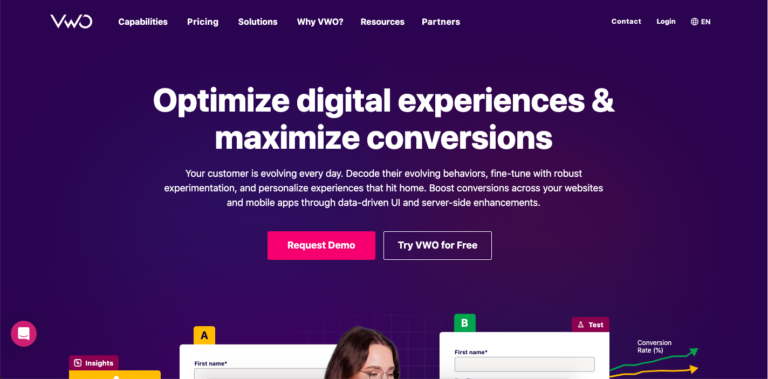
Pros:
- VWO is a comprehensive CRO platform that offers a suite of tools, including A/B testing, heatmaps, and session recordings. It’s a solid choice if you’re looking for an all-in-one solution.
- It supports multivariate testing, which allows you to test multiple variables at once, helping you understand how different elements of your page work together.
- VWO also offers hypothesis tracking, which is useful for keeping track of the various ideas you’re testing.
Cons:
- While VWO is powerful, it’s not the most intuitive platform. It can take some time to get used to, especially if you’re planning on using its more advanced features.
- VWO lacks real-time personalization and predictive capabilities, both of which are becoming increasingly important for driving conversions.
- The pricing can be steep, especially for small businesses, which might make it less accessible for those who are just starting with CRO.
6. Optimizely: Go-to platform for A/B testing and experimentation
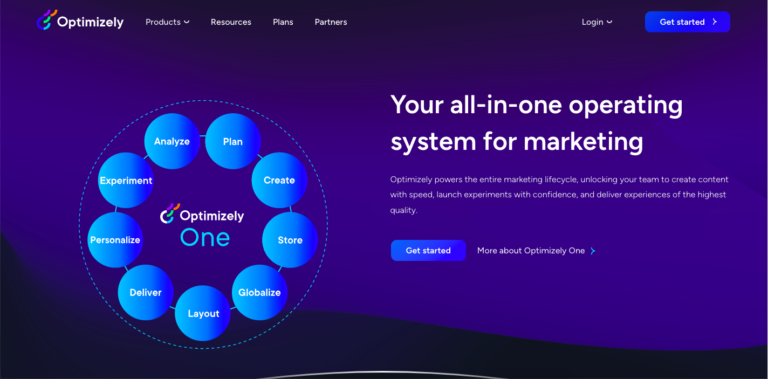
Pros:
- Optimizely is often touted as the go-to platform for A/B testing and experimentation. It offers comprehensive tools for A/B and multivariate testing, which can be invaluable for fine-tuning your website.
- The platform leverages AI-driven experimentation, making it easier to identify winning variations in your tests.
- It integrates seamlessly with most major ecommerce platforms, allowing for smooth data flow and analysis.
Cons:
- Optimizely is not the easiest tool to get up and running, especially if you’re new to CRO. There’s a steep learning curve that can be a bit daunting.
- It’s also one of the most expensive options on the market, making it less accessible for small to medium-sized businesses.
- While it’s powerful, it’s somewhat lacking in real-time personalization, which is becoming increasingly crucial in today’s fast-paced ecommerce world.
7. Crazy Egg: Visual analytics for your ecommerce
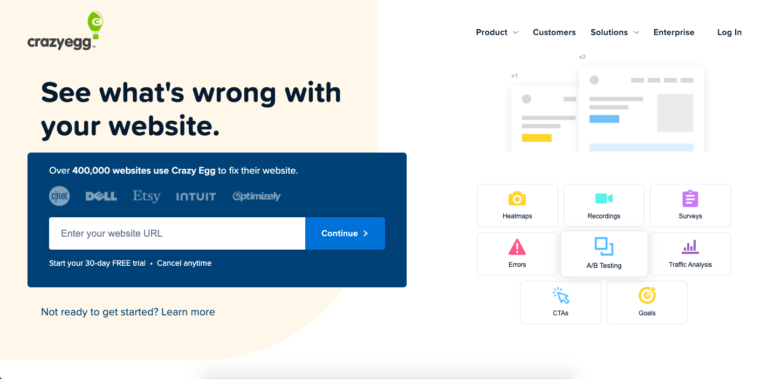
Pros:
- Crazy Egg is well-known for its visual analytics, offering tools like heatmaps, scrollmaps, and confetti reports that help you see how users interact with your site.
- It’s easy to set up and use, making it a good option for those who want quick insights without a steep learning curve.
- The pricing is more affordable than many other tools, which makes it accessible for smaller businesses.
Cons:
- Crazy Egg is primarily focused on visual insights and doesn’t offer the testing or personalization features you’d find in other tools in this list.
- The data processing can be slow, particularly if your site gets a lot of traffic, which can delay your ability to act on insights.
- It’s not designed for full-site optimization, so you’ll need to use it alongside other tools to get the most out of your CRO efforts.
Understand how your prospects behave (in real time)
- Visualize how visitors move across your website
- Identify drop-offs and friction points instantly
- Turn journey data into actionable insights with AI

8. Unbounce: User-friendly interface for landing pages optimization
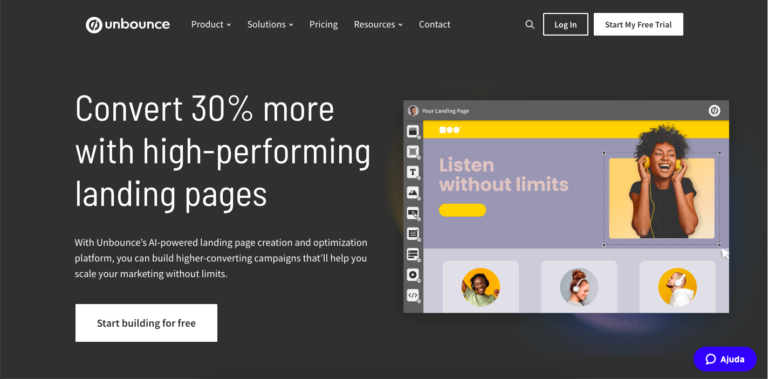
Pros:
- Unbounce is an excellent tool for creating and optimizing landing pages. It comes with built-in A/B testing and smart traffic features that help you optimize each page for conversions.
- The drag-and-drop interface is very user-friendly, making it easy to create custom landing pages without needing to code.
- It’s particularly effective for businesses running a lot of PPC or email campaigns, where landing page performance is critical.
Cons:
- Unbounce is primarily focused on landing pages, so it’s not as versatile as a full-site optimization tool.
- While it does offer A/B testing, it lacks the advanced AI-driven personalization features that can significantly boost conversion rates.
- If you’re looking for a tool that can optimize your entire site, Unbounce might not be the best fit.
9. Convert: A complex platform for experimenting
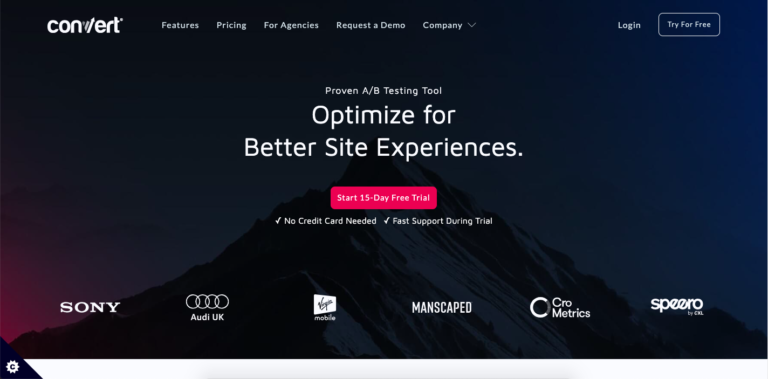
Pros:
- Convert is known for its privacy-focused approach to A/B testing, which is becoming increasingly important with the rise of data privacy concerns.
- It supports complex experiments and allows for detailed targeting, making it a good choice for more advanced CRO practitioners.
- The platform offers excellent customer support and a wealth of training resources, which can be very helpful if you’re new to CRO.
Cons:
- Convert can be overwhelming for smaller teams, particularly those without a dedicated CRO expert. The platform is powerful, but it requires a certain level of expertise to use effectively.
- It’s more expensive than some of the other tools on this list, which might be a barrier for small to medium-sized businesses.
- While it’s strong on testing, Convert lacks the personalization capabilities.
10. FullStory: Tracking performance through user interactions
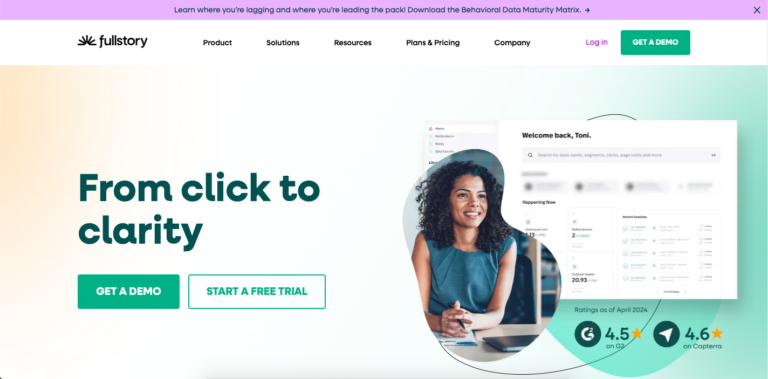
Pros:
- FullStory offers digital experience analytics with session replays, helping you see exactly how users interact with your site. This can be incredibly valuable for identifying pain points and understanding user behavior.
- The platform integrates with various other tools, allowing you to get a comprehensive view of your site’s performance.
- FullStory is particularly good at identifying technical issues that might be hindering your conversion rates, such as broken links or slow-loading pages.
Cons:
- FullStory is on the expensive side, which might be prohibitive for small to medium-sized businesses.
- The sheer volume of data can be overwhelming, making it difficult to know where to start or what to focus on.
- While it’s great for diagnostics, FullStory doesn’t offer the advanced testing or personalization features covered by other tools in this list.
The tools we’ve covered each offer something valuable, whether it’s advanced testing capabilities, insightful analytics, or user-friendly interfaces. However, only one of them offers an all-in-one solution for conversion rate optimization.
Pathmonk’s focus on personalizing the user experience in real-time is a game-changer. So, if you’re serious about maximizing your conversions and getting the most out of your traffic, Pathmonk should be at the top of your list:
- Try out this interactive demo (without any sales calls!);
- Know more about the product by booking a product tour with our team.


